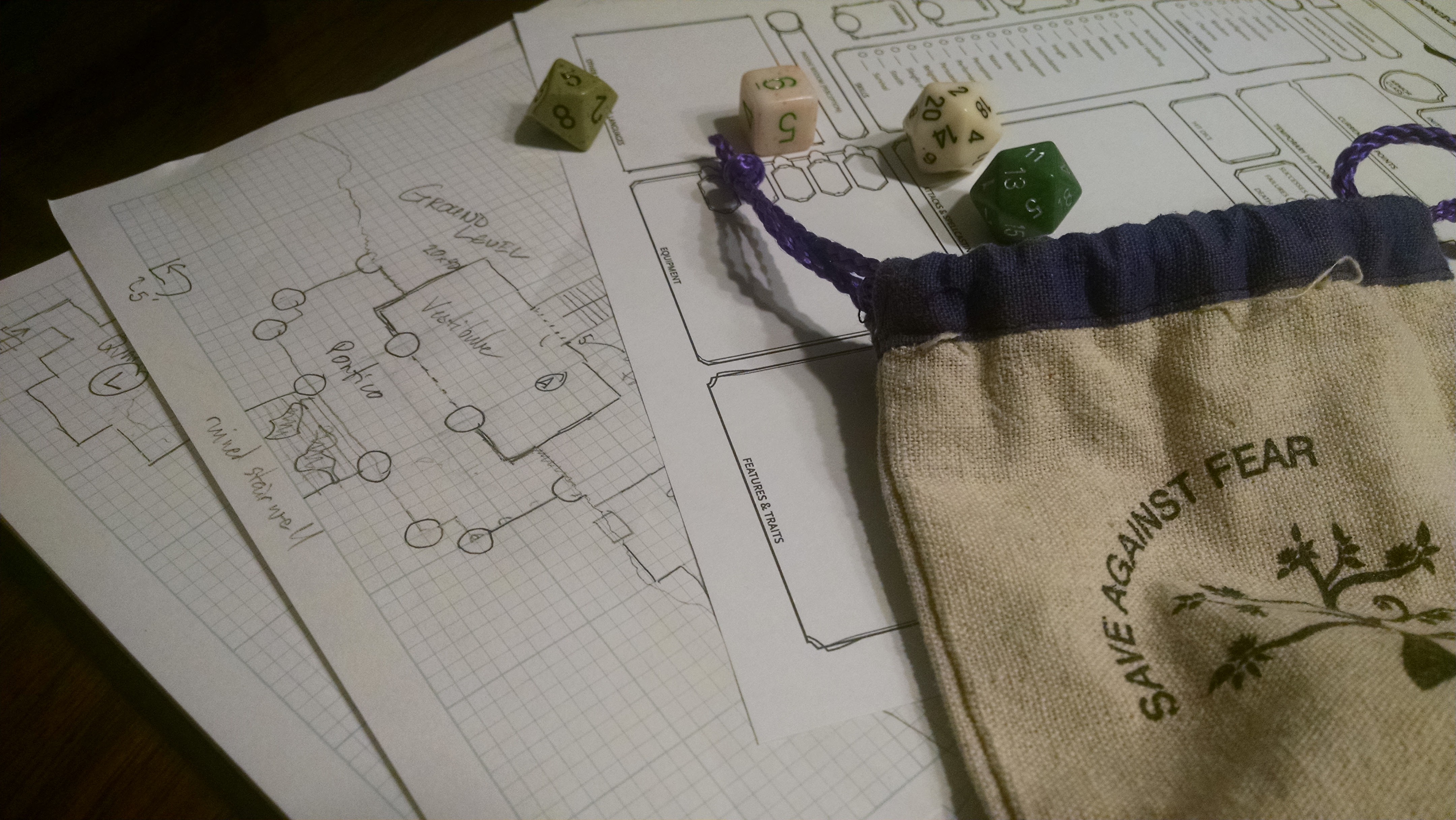Due to a confluence of circumstances beyond anyone’s control, Grant has decided to end his colony game. A cavalcade of illnesses and worse over the course of several months took all of our momentum and we didn’t play for such an extended period of time that Grant actually forgot the voice of one of the key NPCs. And so it is that I must say goodbye to what is, at this point, undisputedly the best player character I have ever had the privilege and pleasure to inhabit.
Origins
Lambert Colvin started out, as I’ve mentioned on the podcast, as a creation of necessity. During my time playing D&D and its descendents across all editions, I have played more clerics than all of the other classes combined. I initially decided that for this game I’d like to try something different. But when Krissi and our third player decided to play a rogue and a fighter, respectively (and both were extremely invested in their respective backstories) I took a step back and rather reluctantly made yet another cleric.
In an effort to do something I hadn’t done before, I picked the Nature domain for Lambert, and took the Hermit background, using these two items to create cleric from a monastic background with a strong focus on compassion and caring for creation as well as traditional religious roles. Lambert’s Monastic order had basically trained him as a sustainability consultant by the time he left the monastery, and his mind was full of information about how to engage in actions such as mining, logging, and farming without burning out the local ecosystem – knowledge important to a colony established on an island and expected to be self-sufficient for an unknown amount of time.
I hit an additional point of uncertainty when I realized that both of the other PCs were going to be Chaotic Neutral to Lambert’s Neutral Good, and we had a discussion about how that contrast was going to be important in play. And in that moment, the first piece of what would become the true essence of Lambert clicked into place.
A lot of the time, “Chaotic Neutral” in D&D translates into “selfish, nihilistic, contrarian jerk,” but that description fits neither Aster nor Garm. Both of them had come from difficult, traumatic backgrounds with just barely enough kindness to keep them from sliding all the way into the darkness. Aster had grown up on the streets and Garm had been fighting to the death since he was barely old enough to walk and never had a clue who his parents were.
And as Lambert discovered both of these things (to his growing horror) he privately resolved to do whatever he could to undo as much of the damage caused by those pasts as he could, not because Aster and Garm weren’t productive enough citizens and needed to be corralled and brought into line, but because they had suffered and he cared. This was a major departure from previous characters I’ve played, if perhaps not terribly obvious from the outside. Almost all of my past PCs were honorable and trustworthy, but most of them were significantly more hardened and cold than Lambert. A number of them were friendly, but none of them were as genuinely kind as Lambert, and furthermore, none were nearly as adverse to violence as Lambert was. For a long time, I had enshrined a sort of “righteous ruthlessness” as a character trait for my PCs, borrowing pretty heavily from characters like Batman and Daredevil. With Lambert, I did my best to let that go.
True Nature
As I mentioned earlier, I built him as a Nature cleric originally, but over the course of playing him, it became apparent that the Nature domain fit poorly with Lambert’s personality and way of doing things. In fact, aside from the nature skill, the extra druid cantrip he received at first level, and the heavy armor proficiency, Lambert never used a single one of the archetype abilities of the Nature domain. He never cast the spells, he never used the ability to dominate wildlife, and so on.What he did do a lot of, from the jump, was healing and feeding people. Even in the opening sessions of the game, Lambert was using magic to purify seawater so the colony had enough to drink. His care for others and his compassion became two of his dominant traits pretty quickly. And so late in the game, with Grant’s permission, I rebuilt him as a Life cleric instead.
Lambert would not exist but for my time as a host on Saving the Game, and without having spoken to some of the guests we’ve had on the podcast, I would lack the proper language to describe him or the impact that playing him has had on me as a person outside the game and away from the table.
One of these people is Dr. Sarah Lynne Bowman, an RPG and LARP researcher who is particularly interested in the subject of bleed. As a quick refresher, bleed is when your emotional state or values as a player affect your character (bleed in) or when events in the game affect your emotional state outside the game (bleed out).
Dr. Bowman has also written a book called The Functions of Role-Playing Games, which I would recommend. Toward the end of the book, she goes into detail about a number of different archetypes of player character that people tend to make. One of those is The Idealized Self.
Regardless of whether or not the character acts heroically, role-playing characters often present the Idealized Self, a persona that possesses qualities the player wishes he or she had. -The Funtions of Role-Playing Games: How Participants Create Community, Solve Problems, and Explore Identity by Dr. Sarah Lynne Bowman pg. 172
Lambert is a textbook Idealized Self character – he is more courageous and more self-sacrificing than I am, and I have used him to explore the edges of my feelings about violence in particular as previous blog posts have attested. He is still a pretty flawed person, though. His anger can take over when he’s confronted with enough evil and under those circumstances, he becomes merciless and violent, making sure, for example, that straggling gnolls don’t escape alive. Some of that was present on a meta level – Lambert was a D&D character, after all, but unlike previous characters of mine that saw themselves as righteous avengers cleaning up the scum of the world and never really thought to be regretful about killing bad guys, Lambert tended to wrestle a lot more with the violence he’d done, even when it was absolutely necessary.
Internality and Self-Examination
One of the defining moments of the game, to me, anyhow, was after the rescue of Fort Formidable and all of the gnoll-killing that entailed. As soon as the party and the remaining colonists from the fort were back safe at the main colony, Lambert went and found the other cleric in the colony and gave him his confession. And then he went off and cried for a while.
The breakthrough for me with Lambert, I think, was not simply deciding that my PC was a good guy and that was that, but that he wanted to be good, in a serious, down-in-his-bones way. He struggled and agonized and considered and tried, and the motivation for that came from a well of compassion and love rather than one of anger or even dignity. And while he didn’t always get it right, I feel like he was better for the struggle than he ever would have been in arrogance. I feel like I am better for letting him struggle and be conflicted, certainly, because his angst, difficulties, and getting it wrong mirror my own.
In fact, more than once, I have deliberately thrown Lambert into situations where I can use him to examine things. I mentioned violence earlier, and that’s been a key one, because my real-world feelings about it have shifted pretty dramatically.
When I was younger, (and not that much younger, either, as recently as my early thirties) I held the position that violence was morally-neutral and the reasons for and targets of it were what mattered from a moral standpoint. If someone was doing something bad and you were reasonably certain talking wasn’t going to work, then going straight to force was justified and okay. Furthermore, I also believed that in those situations where it was warranted, it wasn’t even worth feeling bad over. It was just a thing you had to do. Over the last decade or so, I’ve come to the understanding that such a view isn’t particularly Christian. While I haven’t become a complete pacifist, I have definitely softened a lot on violence, and Lambert has helped me find the borders of that, because I do still feel it’s sometimes warranted – the case of Auntie Bloat is the notable one from our game. (Also, “it was going to eat me” is a valid reason for killing something, and I don’t think there’s any moral issue with hunting or ranching for food.) In fact the position that Lambert eventually came around to that violence is never something to celebrate but may occasionally be necessary is a pretty close fit with my own.
Privilege, and What to Do With It
One of the other major facets of Lambert was what he did with his privilege, which was extensive. And this also mirrors my own experience.
Two quick notes on privilege: the first is that all it means is that someone has some kind of unearned advantage. It can be anything, and it doesn’t necessarily speak poorly of the person possessing it at all! Born attractive or with a nice voice? That’s privilege! There’s nothing wrong with it, but it does mean that, for example, you have additional career paths open to you. If you’ve got the musical talent of someone like Mozart, it’s going to open doors in your life. Second, I think a lot of the time “privilege” comes with the assumption that it’s an ethnic and/or class thing, and that certainly can be the case. On the whole, lighter-skinned people and people from affluent backgrounds have a much easier go of it in the world. However, that’s far from the only form of privilege that can exist – and in my particular case, as well as Lambert’s, the biggest advantages – by far – were love and stability. I grew up with two wonderful, loving parents who cared for me deeply and modeled kindness and compassion to not just me and my sisters, but also each other and the world at large. They are still happily married after over 40 years together, and that environment and the set of examples that came with it are valuable beyond compare. And the nature of that advantage gets more clear all the time when I see some of the rough backgrounds people I know come from.
It was the same with Lambert. Unlike the other two party members, Lambert’s early life and early adulthood were not filled with struggle and danger. The younger of two sons from a middle-class family of kindhearted merchants, he was raised with love and kindness, and with neither want nor luxury. When he was in his mid-twenties, he felt the call to religious service and went off to a monastery where he spent fifteen years in beautiful natural surroundings, living a life of study, contemplation, honest physical labor, and peace. He never had to wonder if he was going to have to fight a friend to the death the next morning like Garm. He never had to wonder where his next meal was coming from like Aster. And the one time he was seriously injured, he had compassionate and skilled medical treatment and some low-level magical healing to help him through it. He didn’t give it much thought until he started becoming friends with Aster and Garm, at which point he started thinking about it pretty regularly and in some depth.
In Lambert’s mind, his background, with its peace, security, and care for others as assumed conditions served as a baseline for what the experience of all people everywhere should be – a life where helplessness, fear, and suffering were the exception, not the daily rule. His worldview could easily be summed up as “Nothing I am and nothing I have is special, and it should not be treated that way. Everyone deserves to have a life like I had, and I will do what I can to ensure that as many people as possible get that without subjecting one people group to privation so another can thrive.” This closely mirrors my own view of my own privilege – I’m not wealthy, never have been, and likely never will be. The relatively-small audience of Saving the Game is the closest thing I’ve ever had to fame. But I have never wondered where my next meal was coming from, never wondered if my parents loved each other and me, never had to worry about random violence directed at me because of where I live or who I am. And Lambert is the same way – his time in the monastic order even mirrors my time at Barnes & Noble – around 15 years of relative comfort and peace that was disrupted when I took a different path.
That desire to be good and the linked desire to give people what he’d had lead to a lot of interesting roleplaying moments. His pathological hatred of slavery wasn’t just based on the fact that Garm was a slave. (Garm was gifted to Aster by her absentee father as a bodyguard – something that Garm was comfortable with but neither Aster nor Lambert was.) It was grounded in the idea that making others suffer so you could enjoy leisure was one of the more horrible things you could do, and he took it out on every slaver he found, though not always with violence. The grungs in particular he just cowed into giving up their slave after the first visit. There is a moment early on Pathfinder: Kingmaker (the video game, not the TTRPG adventure path it’s based on) where you’re confronted by a group of slavers from the Technic League. The Lawful Good option in the dialog tree that presents itself is to say “No negotiations with slavers!” and attack immediately. That was Lambert.
A Bittersweet Goodbye
It bears repeating that none of this would have been possible without the rest of my gaming group, both in character and out of it. As much as I’ve gone on about the inner life of both Lambert and me while playing him, almost everything that made everything that came before actually work in play is to the credit of the other players and Grant as GM. As Krissi mentioned during Episode 139, she started Aster out as wanting to impress her NPC father. By the time the campaign ended, that desire had shifted to wanting to impress Lambert and make him proud instead. That revelation came as a bit of a shock to me the first time I heard it, because I hadn’t realized Lambert had gotten through to her that much. But it’s par for the course with the gaming group – the “core four” (Grant, Krissi, our anonymous player, and me) have been together for about six years now. Our newest additions (Jenny and our new player) have fit in well with the dynamic, and we actually get to explore the character and RP stuff. And not just on a surface level; we get to engage with it in depth, and over time.
That really was driven home for me when we started briefing Jenny on the colony game to introduce her to it. The three of us who had been playing went on for a really long time and in significant depth about what had happened and how the characters all felt about it (and each other) as part of bringing her up to speed. It stretched on for what would have been pages if it hadn’t been a string of messages in an app. None of that goes away just because the game has run its course.
And so, with a heart both heavy and full of gratitude, I bid you farewell, Lambert Colvin. May the new monastery you started in the colony bear a fruit of mercy and compassion, and may the unity you tried to create take hold among the residents of the new world. It was a joy to play you, and I am better for the experience.
Previous posts about the concluded colony game:
Pulled From the Flames
Happy Horvu
The Horror of Prejudice and the Grace of Welcome
Getting Over It
Making Preparations
Justification for Violence
One Foot in Front of the Other
A Sense of Menace
Heroic Legacies
Morality, Privilege, and Redemption
Campaign Report: Player Perspective, Part 1
Campaign Report 4: Into the Witch’s House
Campaign Report 3: Exploration & Narrative Railroading
Campaign Report 2: The Ancient Monastery
Campaign Report: Supplemental Content: Meet the PCs
Campaign Report 1: Playing Sharks and Daggers
The Classics are Classics for a Reason




